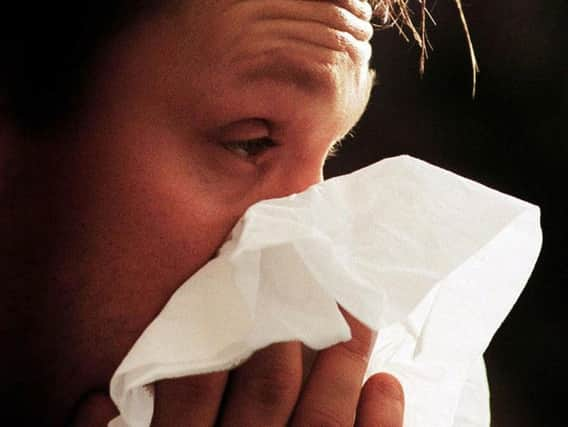PHA urges vaccinations against strain that inflicted worst Australian winter since swine flu pandemic


The call comes as the strains of flu seen during Australia’s winter season, particularly A(H3N2), are increasing in prevalence on this side of the world.
Australia experienced its worst flu season since the 2009 pandemic, and global circulation means we are seeing an increase in cases here too.
Advertisement
Hide AdAdvertisement
Hide AdDr. Jillian Johnston, Consultant in Public Health at the PHA, said: “Getting the free flu vaccine is the single most important thing you can do to help protect yourself against flu. With high levels of flu activity in Australia during their winter, and the potential for similar here, it is more important than ever that everyone who is eligible gets vaccinated.
“We are fortunate to have a more comprehensive flu vaccination programme than Australia or England, but the benefits can only be realised if a high proportion of the groups who can get the vaccine actually take up the offer.
"Everyone who is eligible to be vaccinated against flu should see it as a positive step in protecting their health and the health of others around them. It will also help reduce the burden on our health service during an already busy time of year. All Trusts here make flu vaccine available to healthcare workers.”
Last week this paper reported how one case of swine flu A(H1N1) had been reported amid a huge spike in influenza across the North over the Christmas period although the PHA confirmed we remained just short of its own pre-epidemic threshold.
Advertisement
Hide AdAdvertisement
Hide AdIn the two weeks to Christmas Eve there were 112 detections of influenza A(H3), 61 of influenza B, 53 of influenza A (typing awaited), and one detection of influenza A(H1N1) 2009.
While cases of H1N1 - strains of which caused both the lethal Spanish flu and swine flu outbreaks of 1998 and 2009 respectively, it's H3N2 that's been the focus of health professionals since the Australian winter of 2017.
Back in October Dr. Tom Black Chair of the BMA Northern Ireland’s General Practitioners Committee warned: "We would also encourage everyone who is eligible to get their flu vaccine as we expect the influenza epidemic to be severe this winter."
And although variants of H3N2 are responsible for the seasonal flu in Ireland every year, some strains, such as the Hong Kong flu of 1968/9 and that which affected Australia last winter, can be particularly virulent.
Advertisement
Hide AdAdvertisement
Hide AdSuch flus generally circulate in Asia before spreading to Australia, New Zealand, North America and Europe, according to the World Health Organisation (WHO).
Dr. Johnston said those eligible to get the flu vaccine should do so, especially older people and pregnant women.
She added: “It is also important for pre-schoolers aged two and above and primary school children to get the vaccine. It will not only help to protect them from flu, but also those they come into contact with.
"The Australian experience showed that older people were more susceptible to the A(H3N2) strain of virus, so with families spending a lot of time together at this time of year, getting kids vaccinated can help reduce the spread of flu to older people. If you have a child who is eligible for vaccination but hasn’t yet received it, contact your GP and make an appointment.”
Advertisement
Hide AdAdvertisement
Hide AdThe flu virus spreads through the air when people cough and sneeze without covering their nose and mouth. The vaccine gives the best protection against the same or similar viruses if the body is exposed to them.
Dr Johnston concluded: “Traditionally uptake rates for flu vaccination are high in Northern Ireland, which is a result of the hard work and dedication from health and social care staff, and the excellent response from patients and parents, taking their GP’s advice when they or their kids need the vaccine.
“However, we mustn’t become complacent – we need to maintain high rates of uptake every year to maximise protection for our community. It is important that everyone who is eligible for vaccination – whether they are two or 102 – takes up the offer.”
Some GPs may not invite all of their registered patients who are eligible for vaccination directly. If you, or someone in your care, is eligible to be vaccinated but does not receive an invitation, contact your GP to find out more about their flu vaccination clinics.
Advertisement
Hide AdAdvertisement
Hide AdAs it takes approximately two weeks following vaccination to develop maximum protection against flu, it is important to get vaccinated immediately as flu levels are increasing.
The flu vaccination programme is part of the wider ‘Stay Well this Winter’ programme operated by the Public Health Agency and the Health and Social Care Board which enables people to take simple steps during the colder months to look after their health.
For further information on how to help yourself stay well this winter visit www.nidirect.gov.uk/stay-well